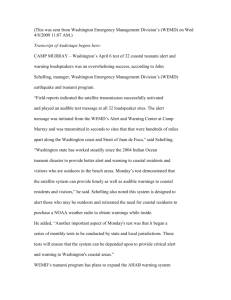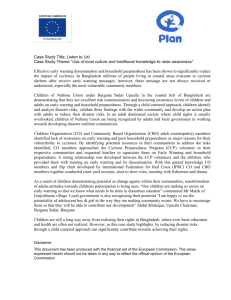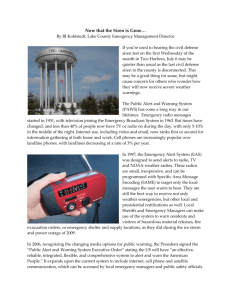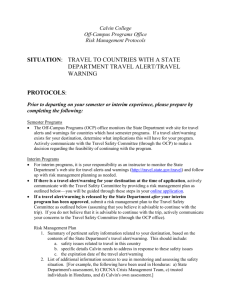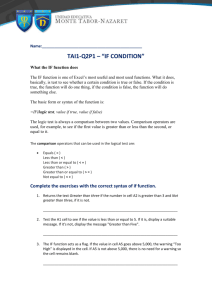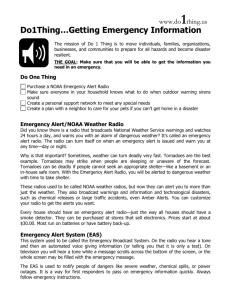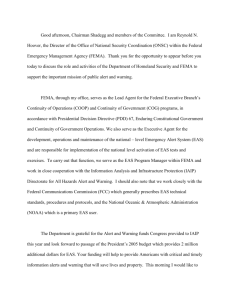Dimitrios Papadimoulis, Member of the European Parliament
advertisement
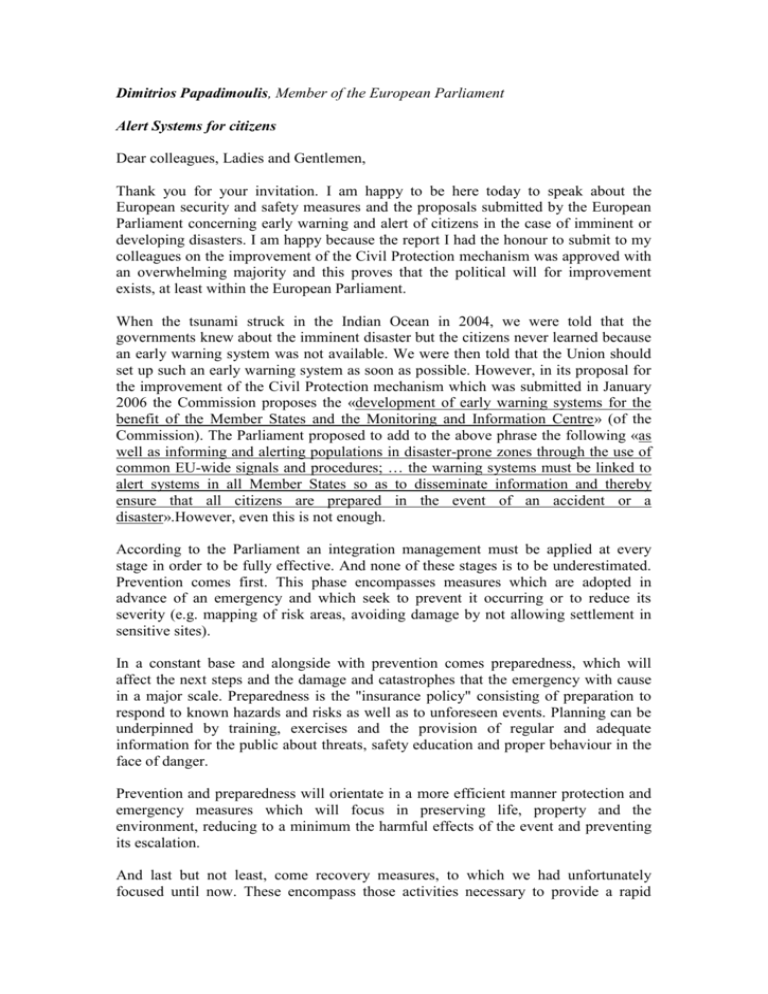
Dimitrios Papadimoulis, Member of the European Parliament Alert Systems for citizens Dear colleagues, Ladies and Gentlemen, Thank you for your invitation. I am happy to be here today to speak about the European security and safety measures and the proposals submitted by the European Parliament concerning early warning and alert of citizens in the case of imminent or developing disasters. I am happy because the report I had the honour to submit to my colleagues on the improvement of the Civil Protection mechanism was approved with an overwhelming majority and this proves that the political will for improvement exists, at least within the European Parliament. When the tsunami struck in the Indian Ocean in 2004, we were told that the governments knew about the imminent disaster but the citizens never learned because an early warning system was not available. We were then told that the Union should set up such an early warning system as soon as possible. However, in its proposal for the improvement of the Civil Protection mechanism which was submitted in January 2006 the Commission proposes the «development of early warning systems for the benefit of the Member States and the Monitoring and Information Centre» (of the Commission). The Parliament proposed to add to the above phrase the following «as well as informing and alerting populations in disaster-prone zones through the use of common EU-wide signals and procedures; … the warning systems must be linked to alert systems in all Member States so as to disseminate information and thereby ensure that all citizens are prepared in the event of an accident or a disaster».However, even this is not enough. According to the Parliament an integration management must be applied at every stage in order to be fully effective. And none of these stages is to be underestimated. Prevention comes first. This phase encompasses measures which are adopted in advance of an emergency and which seek to prevent it occurring or to reduce its severity (e.g. mapping of risk areas, avoiding damage by not allowing settlement in sensitive sites). In a constant base and alongside with prevention comes preparedness, which will affect the next steps and the damage and catastrophes that the emergency with cause in a major scale. Preparedness is the "insurance policy" consisting of preparation to respond to known hazards and risks as well as to unforeseen events. Planning can be underpinned by training, exercises and the provision of regular and adequate information for the public about threats, safety education and proper behaviour in the face of danger. Prevention and preparedness will orientate in a more efficient manner protection and emergency measures which will focus in preserving life, property and the environment, reducing to a minimum the harmful effects of the event and preventing its escalation. And last but not least, come recovery measures, to which we had unfortunately focused until now. These encompass those activities necessary to provide a rapid return to normality. When faced with an imminent disaster, citizens are often panic stricken and lose control. Telling people that a tsunami, a flood, a chemical or radiological cloud or a bombing attack is imminent will not save them unless somebody tells them what they are expected to do. In principle for such large scale emergencies citizens have two possibilities – either to stay confined in their houses or other closed spaces or to flee the area and move to appropriately protected terrain. This is why we proposed the inclusion of the following phrase «identification of best practices to raise citizens' awareness and dissemination to the public of information on safety behaviours in the event of major risks; … ) drawing up guidelines for the information and education of citizens aimed at increasing their awareness and improving their self-protection ». Training citizens, especially children, has proved critical in saving lives. In Greece, the continuing campaigns of the Earthquake Planning and Protection Organisation in schools over recent years led to children guiding their panicking parents during recent earthquakes. Furthermore, the Commission although verbally very active in the field of interoperability – another issue of your Conference - forgot to explicitly mention it in its proposal. Thus we proposed that Community action should ensure «the interoperability of equipment used as well as other support at Community level to facilitate the interventions; … promoting the interoperability of the alert, early warning and response systems; … ». In many interventions EU teams come with their own equipment which despite the Single Market is very often non-interoperable. The most known example is the TETRA and TETRAPOL non-interoperable technologies in the narrow band of the spectrum (380-395 MHz). Well, in several replies to Parliamentary Questions, as well as in its last report on the implementation of the telecommunications legislative framework, the Commission declares that implementing an efficient 112 in the EU depends on Civil Protection services which are outside the scope of the Treaties. Early warning and alert of populations however is WITHIN the scope of the Treaties. It is foreseen is several strong EU acts namely the directives dealing with Safety and health signs at work (92/58/EEC), with major chemical installations (Seveso Directive 96/82/EC), with Radiological Emergencies (89/618/Euratom), with the transport of dangerous goods, etc. An interoperable, EU-wide system for the early warning and alert of citizens can is legally possible. The technologies that can make it happen certainly exist – from classical sirens to GSMs to modern RDS-equipped radios, the internet and (almost) digital TVs. So it is essential that some action should be taken the sooner the better Better sharing of information on available resources, expertise and successful strategies and practices at national level More training and cooperation for intervention teams and participation of citizens as volunteers Better communication, co-ordination, in time information systems for the prompt information of public and link with other networks Changing of the current insufficient and bureaucratic financing Strengthening social partnership by informing everyone and with a more active involvement of civil society & local authorities Empowerment of research and development of emergency systems for a more efficient management of disasters. Implementation of subsidiarity principle and drawing national plans for emergency co-ordination. The political will has been expressed by 573 votes for 25 against and 35 abstentions, in the voting of this report. The series of disasters, manmade or not, over the last years such as floods, heat-waves, forest fires, earthquakes, pollution incidents by toxic waste release, serious industrial accidents and also terrorist attacks have claimed innumerable victims, caused increasingly significant economic damage and devastated the lives of millions of people around the world. These catastrophes disrupt the economies of the countries affected, hitting the poorest and most vulnerable layers of the population in the developed world, affecting the poorest countries hardest, and are generally regarded as a major obstacle to sustainable development and efforts to reduce poverty. The time has come for efficient action!

